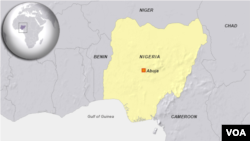Nigerian authorities in the capital city of Abuja on Saturday said they're investigating the killing and burning of a man by a mob over accusations of blasphemy. Blasphemy has been a subject of debate in Nigeria in recent weeks after a Christian woman was also burned in the northwestern Sokoto State.
The Abuja Police Command public relations officer, Josephine Adeh, in a statement Saturday said the latest victim was 30-year-old Ahmad Usman a local vigilante member.
She said Usman was involved in an argument with an unidentified Muslim cleric in the Lugbe area of Abuja and it escalated.
She said a mob, numbering about 200, who were supporting the cleric, beat, stoned and then set Usman ablaze before police officials intervened.
"We received a distress call and then we responded to it by deploying our men from Lugbe division,” Adeh told VOA by phone. “We were able to rescue the victim, who suffered a severe degree of burns, and then we took him immediately to the hospital where the doctor confirmed him dead."
Police surveillance and ambush teams have been patrolling the area since the incident. Adeh said normalcy has been restored. No arrests have been made.
Abuja’s police commissioner on Sunday said the perpetrators will be sanctioned and warned against the use of so called “jungle justice” — taking the law into one’s own hands.
However, many businesses in the area remained shut Saturday evening over fear that more violence could erupt.
"The area is calm now, there's not much movement around based on what happened earlier, said Princewill Azubuike, a Lugbe resident. “There were gunshots earlier in the afternoon and there were people running around."
Blasphemy is a sensitive topic in Africa's most populous nation with a delicate balance of Muslim and Christian populations.
Three weeks ago, a mob in northwest Sokoto state killed and burned the body of a Christian student of the Shehu Shagari College over alleged blasphemy.
The incident triggered protests by Christian groups and human rights organizations. Some of the groups called for the authorities to expunge blasphemy from punishable crimes under the Nigerian law, but for now, it remains on the books.




